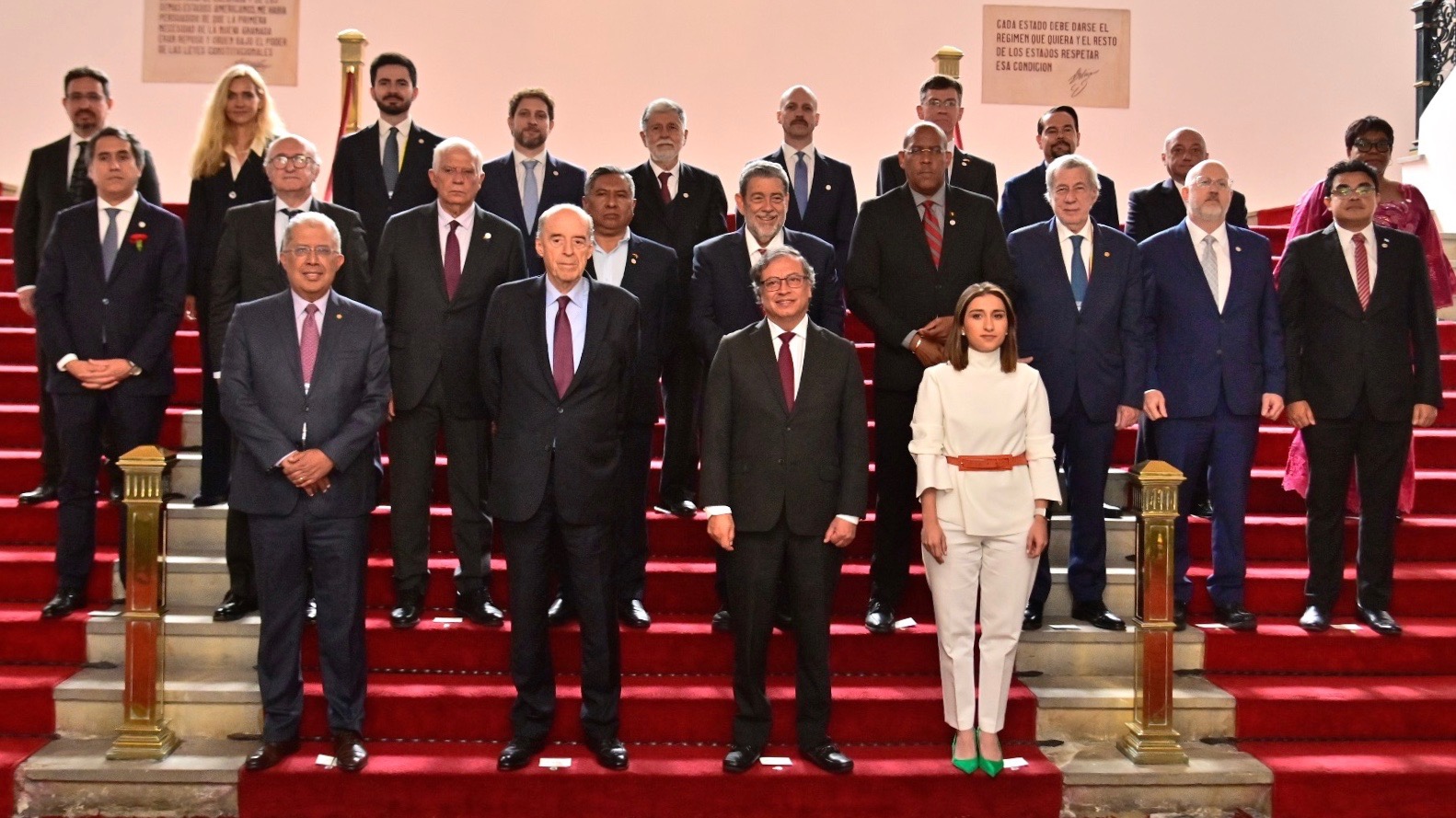On Tuesday, April 25, Colombian President Gustavo Petro hosted world leaders in Bogotá for a one-day conference to discuss the political situation in Venezuela. The summit, called the International Conference on the Political Process in Venezuela, was held at the headquarters of the Foreign Ministry and was attended by representatives from 19 countries and the European Union (EU).
The meeting was aimed at reigniting the paralyzed dialogue and negotiation process between the government of Venezuelan President Nicolás Maduro and the platform of the US-backed far-right opposition sectors. The last dialogues between the Venezuelan government and the opposition began in Mexico City, Mexico, in August 2021 and ended in November 2022.
In the opening speech, Colombian President Petro outlined a brief history of the construction of democracy in the Americas, and emphasized that the region should not be a space of sanctions, referring to the blockades imposed by the United States on Venezuela, Cuba and Nicaragua. “The Americas cannot be a space of sanctions. It has to be a space of freedoms and democracy,” he said.
He said that Latin America is at a crossroads, and “the history of Latin America is in our hands. We can either mark a path that leads toward war and the deconstruction of democracy, or we can rebuild the path of peace and democracy.”
In this regard, he invited the attendees to help find solutions for Venezuela. Petro called on the international community to lift all coercive measures against Venezuela, recognizing the economic suffering inflicted on the population. “Venezuelan society does not want to be sanctioned because the sanctions have fallen on the people,” he stated.
At the same time, he asked his Venezuelan counterpart to establish an election calendar ahead of the 2024 presidential elections. He also recommended that Venezuela re-enter the Inter-American Human Rights System.
Final declaration
At the end of the meeting, Colombia’s Foreign Minister Álvaro Leyva read the final declaration of the conference, in which the attendees suggested three proposals to help resolve the differences in Venezuela.
The first point was “establishing an electoral timetable that allows free and transparent elections with full guarantees for all Venezuelan actors.” In this regard, Leyva added that the attendees considered “the importance of taking into account the recommendations made by the European Union Electoral Observation Mission in 2021.”
In the November 2021 regional elections, most opposition parties—which had been boycotting elections for years—took part. The elections yielded a resounding victory for the ruling United Socialist Party of Venezuela (PSUV) and other Chavista forces.
The second point advocated that agreements between delegations of the Venezuelan government and the opposition should be “in parallel with the lifting of the various sanctions” against the country.
The third established that “the continuation of the negotiation process, mediated by Norway and that took place in Mexico, be accompanied by the acceleration of the implementation of the Single Trust Fund for social investment” in Venezuela.
During the last round of talks, held in November 2022 in Mexico, the delegations signed an agreement on social matters. which stipulated US$ 3.2 billion in Venezuelan funds—frozen in international accounts due to the US sanctions—for investment in education, healthcare, and infrastructure repairs. However, the agreement never materialized and the resources have yet to be made available to the country.
Representatives from Argentina, Barbados, Bolivia, Brazil, Canada, Chile, France, Germany, Honduras, Italy, Mexico, Norway, Portugal, Saint Vincent and the Grenadines, South Africa, Spain, Turkey, and the United Kingdom, as well as the United States, participated in the summit. Neither the Maduro government, nor the opposition parties were invited although the summit received the support of both sides.
Hours before the meeting, in a televised broadcast, President Maduro said, “we do not accept anything less from this conference in Bogotá than the lifting of all sanctions so that Venezuela has commercial, financial, and economic freedom, so that the permanent aggression against our economy may end, and we recover everything that must be recovered in the economic, production and social arenas.”
Venezuela acknowledges deliberations
Following the summit, the Venezuelan government issued a statement “acknowledging the deliberations.” In addition, it reiterated the “imperative need to lift each and every one of the unilateral, illegal and harmful coercive measures of international law, which constitute an aggression against the entire Venezuelan population.”
It demanded “the return of the assets belonging to the Venezuelan State and illegally retained by foreign countries and financial institutions as well as the immediate release of the Venezuelan diplomat Alex Saab, unjustly detained in the US.”
The government reminded the opposition and the international community that the resumption of negotiations involves “full compliance” of previous agreements between the two parties.
Since coming to power in Colombia, Petro has supported the dialogue process between his Venezuelan counterpart Maduro and his opponents, and offered to help resolve the crises in the country. On April 20, the Colombian leader made his first official visit to the United States and met with US President Joe Biden and requested the gradual removal of economic sanctions against Venezuela.





